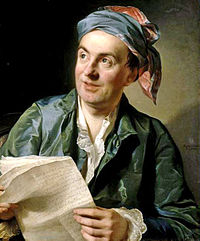Jean-François Marmontel

Jean-François Marmontel (French pronunciation: [ʒɑ̃ fʁɑ̃swa maʁmɔ̃tɛl]; 11 July 1723 – 31 December 1799) was a French historian, writer and a member of the Encyclopédistes movement.
Biography
This section needs additional citations for verification. (May 2014) |
He was born of
From 1748 to 1753 he wrote a succession of tragedies: Denys le Tyran (1748); Aristomene (1749); Cleopâtre (1750); Heraclides (1752); Egyptus (1753). These literary works, though only moderately successful on the stage, secured Marmontel's introduction into literary and fashionable circles.[1]
He wrote a series of articles for the
In 1758 he gained the patronage of
He was appointed historiographer of France (1771), secretary to the Academy (1783), and professor of history in the Lycée (1786). As a historiographer, Marmontel wrote a history of the regency (1788). Reduced to poverty by the
Marmontel lived for some time under the roof of
He was a member of the Masonic lodge Les Neuf Sœurs.
John Ruskin named him as one of the three people in history who were the most influential for him.[4] In his autobiography, John Stuart Mill credits Mémoires d'un père with curing him of depression.[5]
Works
Theatre
Marmontel published many opera librettos and mostly operas comiques librettos, a genre in which he excelled but could not compete with
- 1748: Denys le tyran, tragedy, 5 February
- 1749: Aristomène,[6] tragedy, 30 April
- 1750: Cléopâtre, tragédie, 20 May
- 1751: acte de ballet, music by Jean-Philippe Rameau
- 1751: Acante et Céphise, pastorale héroïque in three acts, music by Jean-Philippe Rameau
- 1752: Les Héraclides, tragedy, 24 May
- 1753: Égyptus, tragedy
- 1753: Lisis et Délie, pastorale héroïque in 1 act, music by Jean-Philippe Rameau
- 1753: Les sibarites, acte de ballet, music by Jean-Philippe Rameau
- 1761: tragédie lyrique, music by Antoine Dauvergne
- 1762: Annette et Lubin
- 1766: La Bergère des Alpes
- 1768: Le Huron, opera comique, music by André Grétry
- 1769: Lucile, opéra comique, music by André Grétry
- 1770: Sylvain, opéra comique, music by André Grétry
- 1771: L'amie de la maison, opéra comique, music by André Grétry
- 1771: Zémire et Azor, opéra comique, music by André Grétry
- 1773: Céphale et Procris, ballet héroïque, music by André Grétry
- 1775: La Fausse magie, opéra comique, music by André Grétry
- 1783: Didon, opera, music by Niccolò Piccinni
- 1785: Pénélope, opéra comique, music by Niccolò Piccinni
- 1788: Démophoon, music by Luigi Cherubini.
Poetry
- Polymnie, satire en 11 chants
- 1751: L’établissement de l’École militaire,
- 1752: Vers sur la convalescence du Dauphin,
- 1753: La naissance du duc d’Aquitaine,
- 1760: Épître aux poètes,
- 1820: La Neuvaine de Cythère,[7] (licencious poem)
Novels
- 1755–1759: Contes moraux,
- 1767: Jacques Louis David Bélisaire demandant l'aumône)
- 1777: Les Incas, ou la destruction de l'empire du Perou
- 1792: Nouveaux contes moraux
Essays
- 1763: Poétique française, 3 parts: a work in which Boileauare strongly attacked.
- 1777: Essai sur les révolutions de la musique en France,[9]
- 1785: De l’Autorité de l’usage sur la langue,
- 1787: Éléments de littérature. Modern edition at Desjonquères, presented, established and annotated by Sophie Le Ménahèze, 2005.
- 1788: Mémoire sur la régence du duc d’Orléans
- 1792: Apologie de l’Académie française.
Varia
- 1746: L'Observateur littéraire : literary journal established with Jean-Grégoire Bauvin (or Beauvin); « Cette feuille, écrira-t-il, n'étant ni la critique infidèle et injuste des bons ouvrages, ni la satire amère et mordante des bons auteurs, elle eut peu de débit.» . The title was revived by abbé de La Porte in 1758.
- 1712–1714: The Rape of the Lock by Alexander Pope, translated into verse La boucle de cheveux enlevée, 1746. Edition bilingue moderne chez Rivages poche, 2010, 142 pages (ISBN 9782743621377)
- 1759: édition remaniée de Venceslas by Rotrou,
- 1766: La Pharsale de Lucain, translated into prose,
- 1775: édition des Chefs d’œuvres dramatiques de Mairet, Du Ryer et Rotrou, with a Commentaire,
- 1800: Mémoires d’un père pour servir à l’instruction de ses enfants,
- 1806: Leçons d’un père à ses enfants sur la langue française.
Notes
- ^ a b c d e f Chisholm 1911.
- ^ Frank A. Kafker: Recherches sur Diderot et sur l'Encyclopédie. Année (1990) Volume 8 Numéro 8 p. 102
- ^ Sainte-Beuve, Causeries du lundi, iv.; Morellet, Eloge (1805)
- ^ "John Ruskin: Sesame and Lilies". Archived from the original on 24 February 2009. Retrieved 9 September 2017.
- ^ Collected Works of John Stuart Mill (1981) London, Routledge, Vol. 1, (p. 145)
- ^ Marmontel, Jean-François (1723-1799) Auteur du texte (1750). Aristomène, tragédie, par M. Marmontel. [Comédiens ordinaires du Roy, 30 avril 1749].
{{cite book}}: CS1 maint: numeric names: authors list (link) - ^ Marmontel, Jean-François (1723-1799) Auteur du texte (1879). La neuvaine de Cythère / par Marmontel,...; avec notice par M. Charles Monselet.
{{cite book}}: CS1 maint: numeric names: authors list (link) - ^ Ce livre interdit a directement fait l'objet d'une critique Examen du Bélisaire de M. Marmontel
- ^ Marmontel, Jean-François (1723-1799) Auteur du texte (1777). Essai sur les révolutions de la musique, en France.
{{cite book}}: CS1 maint: numeric names: authors list (link)
References
- Mallet du Pan, Jacques. (1800). "Character of Marmontel". The European Magazine, and London Review. 37: 103–104.
- This article incorporates text from a publication now in the public domain: Chisholm, Hugh, ed. (1911). "Marmontel, Jean François". Encyclopædia Britannica. Vol. 17 (11th ed.). Cambridge University Press. p. 745.

